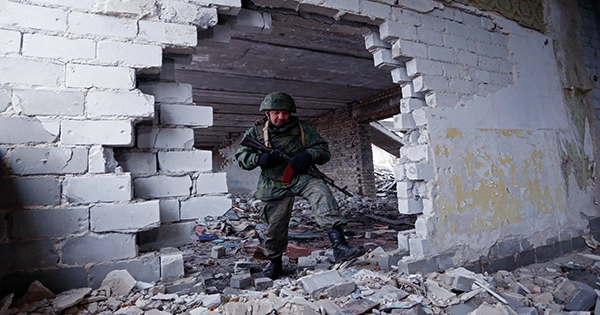According to Sir Jeremy Fleming, the chief of the espionage organization GCHQ, the crisis in Ukraine represented a paradigm shift in the way intelligence was disseminated.
Prior to Russia’s invasion, Washington and London took the extraordinary step of making their knowledge of its preparations public.
Avril Haines, the director of US intelligence, indicated that lessons had been learnt, particularly the limitations of such actions to make intelligence public.
For the Today program on Radio 4, Sir Jeremy spoke with her.
Sir Jeremy Fleming, a 30-year veteran of the secret world, said that declassifying material was “very hard in many ways” because it took a lot of work to gather secret intelligence, but there was little sense in gathering it if it couldn’t be put to use.
He claimed that while he agreed with the radical shift of disseminating intelligence and using it to challenge a narrative, the majority of people did not share his convictions.
Additionally, he claimed that a novel kind of battle, one in which intelligence played a key role, had occurred in Ukraine.
In her talk with Sir Jeremy, who is serving as the Today programme’s guest editor, Ms. Haines stressed the importance of keeping the general public informed about what is happening and involving them in the discussion more significantly.
Ms. Haines, who oversees all of America’s spy agencies as director of national intelligence, was instrumental in pushing for the declassification and publication of critical intelligence before to Russia’s incursion in February.
This extraordinary action was designed to discourage Russia and refute its assertions that it was acting defensively.
“We were able to have an impact,” Ms Haines said, “at the same times what also is clear… is that our impact was far greater in the West than it was in other places in the world.”
She said that the attempts in Russia had “essentially no impact” due to the Kremlin’s control over media flows there.
According to Ms. Haines, authoritarian nations have an asymmetric advantage in that they successfully control the information reaching their citizens.
She continued by saying that Russia also attempted to exploit the free flow of information in western cultures to advance its narratives and deepen social tensions.
For Western intelligence communities, figuring out how to comprehend and counteract this foreign influence was a burgeoning field, she added.
She claimed that “the Russians launched a very coordinated information campaign on these subjects throughout the world.”
One of their key claims is that the United States provoked the crisis and that NATO and Ukraine were threatening Russia and preparing the stage for it, which put them into this situation.
Additionally, Sir Jeremy claimed that “much of the world” had not fully accepted the Western side of the debate. The head of GCHQ emphasized the significance of including voices outside of the government and intelligence community in the discussion.
There are several alliances that allow us to showcase and show that we are more trustworthy, he said.
According to Sir Jeremy, the private sector had a significant impact on the conflict, whether it was through the work of firms like Microsoft in providing cyber-defence for Ukraine or commercial satellite images that may support intelligence allegations about troop buildups.
In a different interview for the show, Sir Jeremy denied the notion that GCHQ had been exposed by Edward Snowden’s revelations, saying the former US intelligence agent had cost the UK “blood and money” by disclosing information on top-secret programs.
When asked if his successor might become the first woman to head GCHQ, Sir Jeremy responded, “Let’s hope so,” noting that neither a woman nor someone from an ethnic minority group had held that position before and that it was time for intelligence organizations to “demonstrate a difference at the top.”













